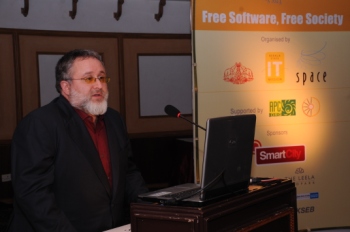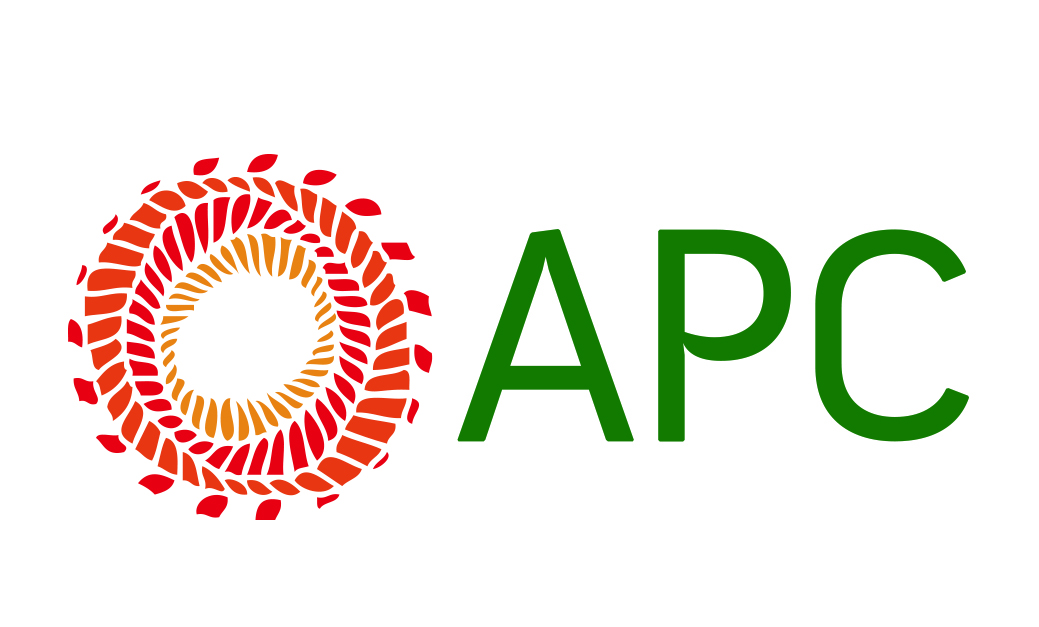 The Conference was kicked off at the Mascot Hotel Convention Centre, Thiruvananthapuram, with the keynote address by Eben Moglen, a professor at the Columbia University, and is the founder, Director-Counsel and Chairman of Software Freedom Law Center. Mr Moglen said that the highest level of inequality is the inequality that arises out of the concentration of knowledge with a minority. The lack of knowledge that arises out of this creates intellectual poverty. This intellectual poverty can be removed only by showing the means and ways to overcome it to the society. During the times of technological revolution there was a call to share knowledge without any shackles. The Free Software Movement stood in the forefront of this ideology. In the 21st century, if personal freedom needs to be preserved then freedom is essential in computing and technology and hence the role of Free Software becomes all the more important. As the importance of free software has increased so has its responsibilty to the society.
The Conference was kicked off at the Mascot Hotel Convention Centre, Thiruvananthapuram, with the keynote address by Eben Moglen, a professor at the Columbia University, and is the founder, Director-Counsel and Chairman of Software Freedom Law Center. Mr Moglen said that the highest level of inequality is the inequality that arises out of the concentration of knowledge with a minority. The lack of knowledge that arises out of this creates intellectual poverty. This intellectual poverty can be removed only by showing the means and ways to overcome it to the society. During the times of technological revolution there was a call to share knowledge without any shackles. The Free Software Movement stood in the forefront of this ideology. In the 21st century, if personal freedom needs to be preserved then freedom is essential in computing and technology and hence the role of Free Software becomes all the more important. As the importance of free software has increased so has its responsibilty to the society.
The paper on Network Civilisation was presented by Michel Bauwens, a Belgian integral Philosopher. He spoke on how Peer to Peer Networking is becoming the new mode of production from the capitalist mode of production.
Nagarjuna, the chairman of FSF India and Venkatesh Hariharan, Corporate Affairs Director for RedHat's Indian subcontinent operations, participated in the panel on Open Standards. According to Venkatesh, coding and decoding are the basic rights of man. Man has created standards and has built patents around it to deny the basic rights of the end user. A classic example of this denial is the OXML preached by Microsoft. Venkatesh was highly critical of the Intellectual Property Rights realm and the patent regime. The limit to this was the patenting of certain yoga postures in the US.
The panel on 'Free Software and Global South' saw Rahul De, Professor at IIM Bangalore, Aslam Raffee presenting their papers. Rahul De felt that even though a lot of work was going on in the free software arena but effort needs to be taken in the Government level.
Representatives from the Kerala State Electricity Board (KSEB), NIC, the Khadi Board and KELTRON made presentations on the areas where FOSS is being implemented in their respective departments. A presentation on ICT and Grama Panchayaths was also made. They were speaking as part of the panel on Free Software in e-governance.
The panel on Development as Freedom - Free Software Partner in struggle for development saw presentations being made by Jacob John of Just Change, Gudalloor, Paniadima John, Stalin Cletus, Krishnakanth Mane and Sathyasheelan. Jacob John spoke about how ICT and free software made a difference to the work that Just Change is doing among the adivasis of Gudalloor. Paniadiama spoke of how FOSS has changed his life as a fisherman. The narrowcasting that is being done through Radio Alakal passes on information to the fishermen on changes in weather and also programmes of interest to the fishermen community. Krishnakant Mane, an ICT and accessibility advisor, spoke about the various accessible technologies available in FOSS.
The inauguration ceremony took place in Senate Hall, Trivandrum at 5.30 PM. The Chief Minister of Kerala inaugarated the ceremony and delivered the inaugural address. The keynote address was delivered by Richard M Stallman. Neville Roy Singham, Juan Carlos Gentile, Joseph Mathews, Dr. AjayKumar IAS and Dr. Rathan Kelkar addressed the audience. The ceremony concluded with a Koodiyattom programme.
| Attachment | Size |
|---|---|
| 51.32 KB |


